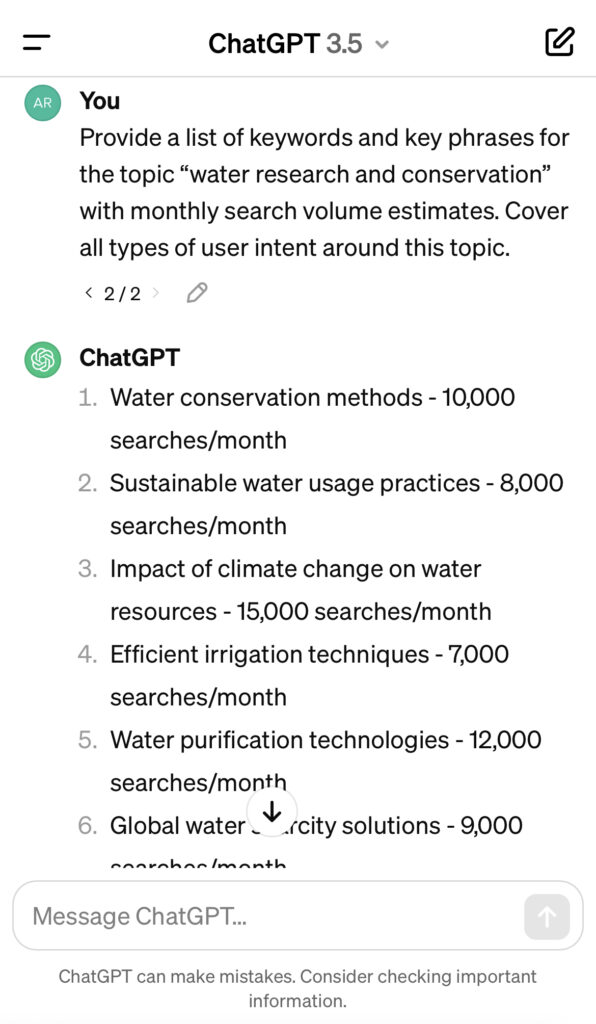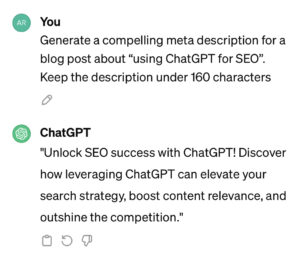With the introduction of ChatGPT in 2022, we (un)officially entered the artificial intelligence (AI) era. Artificial intelligence, which until a couple of decades ago was just a fancy word thrown around in the sci-fi world, has now arrived. Don’t get me wrong, AI, unbeknownst to a lot of us, was already being used in many spheres of life, but with technologies like ChatGPT, it has become a tool for day-to-day work and life.
For those who are unfamiliar, ChatGPT is an advanced AI tool that utilizes deep learning techniques to generate human-like text responses for user queries (or prompts). In this blog post, I present a few scenarios on how you can use ChatGPT prompts for elevating your SEO game. A word of caution here: ChatGPT is known to throw erroneous responses for certain queries, and the database that it is trained on runs until 2022. Plus, it lacks human-like common sense. So, it has to be used with all these limitations in mind.
That said, let’s dive into some common ChatGPT prompts that can assist you with your SEO efforts.
Get content ideas
Prompt: “Provide [XX] number of engaging blog post ideas related to [subject].”
Or
Prompt: “Provide engaging blog headlines related to [subject]”
Once you get a rough idea of what you are writing about, it is time to do some keyword research. Strategically placing highly-searched key phrases in your web page’s title, sub-headings and content body is important.
Build topic clusters for evergreen content
ChatGPT database runs up to 2022, so it would not be able to give you insights on real-time trending topics or the latest keyword search volumes, but one thing that it is pretty good at generating is lists of evergreen topics. These are topics that are not tied to current trends or events that may quickly become outdated.
Prompt: “Create evergreen content ideas around the topic [topic] that will remain relevant and valuable to the audience over an extended period.”
Generate seed keywords
While ChatGPT may not be great at serving search volume estimates, it can be an excellent tool for generating a seed list of keywords or themes. Once you have a list of keywords, look for search volume estimates in a keyword tool such as Google’s Keyword Planner.
Prompt: “Provide a list of keywords and key phrases for the topic [topic].”
Generate meta descriptions
A meta description is a brief summary or snippet of text that provides a concise overview of the content of a web page. It typically appears below the title tag in search engine results pages. While search engines like Google may sometimes generate their own snippets based on page content, having a self-crafted meta description gives you more control over how your content is presented in the search results.
Prompt: “Generate a compelling meta description for a blog post about [topic]. Keep the description under 160 characters”
Or
Copy and paste your content body into ChatGPT and ask it to provide a relevant meta description.
Perform keyword audits for existing pages
Copy the entire content body of your webpage and paste it in ChatGPT. Ask it to analyze if your target keyword and its variations are appropriately placed in the page.
Prompt: “Check whether the page content pasted above would be able to rank for the keyword [keyword] on Google. Suggest additional keyword placement opportunities and highlight them in red”
Generate FAQs
Search engines for the last few years have turned into answer engines where a lot of search queries are in the question format. Re-formatting your content body to include highly-searched questions as page titles or sub-headings can be rewarding for your SEO efforts. Some websites have dedicated FAQ sections that serve as the entry points for the rest of their website. ChatGPT can be helpful in generating Q&A-style key phrases that you can include in your content body. However, these should always be checked for relevance to your subject.
Prompt: “Generate five frequently asked questions (FAQs) and answers related to [subject].”
Understand user intent
User intent is crucial in SEO because search engines aim to provide users with the most relevant and satisfying results for their queries. Understanding user intent helps search engines deliver accurate and valuable results, aligning with the user’s expectations and needs.
Prompt: “Analyze user intent for the query ‘how to [user query]’ and suggest content that aligns with that intent.”
With each of the prompts above, I would recommend experimenting and making these your own. For better results, make sure to provide ChatGPT with as much context as possible. ChatGPT is a powerful tool for generating ideas for content, but it should never be used as a content-generating machine. It should be used in conjunction with human expertise, especially in areas that require specific industry knowledge, current trends, or localized insights.

